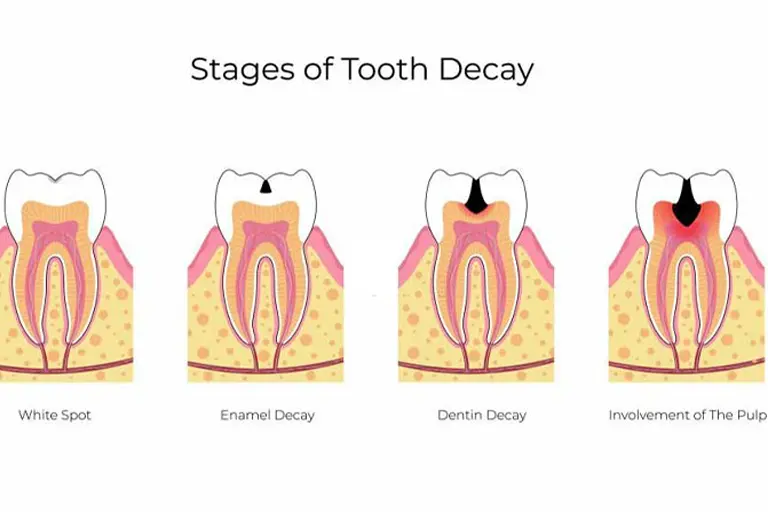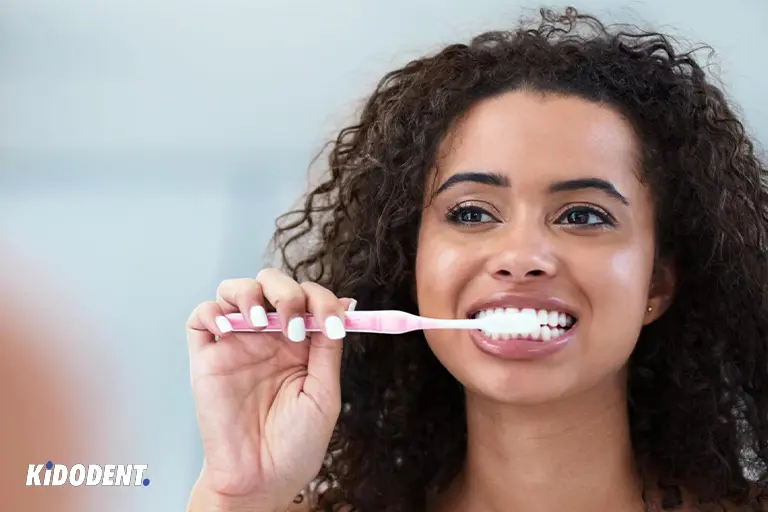When you don’t brush your teeth, you are contributing to the accumulation of plaque buildup on your teeth. You may ask “What is plaque?” Plaque is the biofilm of hundreds of bacteria that colonize the surface of your teeth, which should be removed through brushing teeth and flossing. As the plaque feeds more on the food particles, especially sugary foods and drinks, it produces acid. Then the acid destroys the enamel structure of your teeth and teeth will decay over time and wear down, leading to cavities and finally tooth loss.
If plaque is not removed through brushing and flossing, it hardens or mineralizes. This stage is called calculus or tartar and requires a dentist to take action to remove the hardened dental plaque.
Why brushing teeth is essential?
What ADA (American Dental Association) puts forward on the importance of toothbrushing is that any individual should brush their teeth twice a day with a soft-bristled toothbrush and toothpaste containing fluoride. This rule is to get rid of plaque and prevent the risks of dental caries in each brushing and help the remineralization process of teeth.
Is brushing teeth enough for my teeth and gums’ health?
Along with brushing your teeth, it is necessary to floss and use mouthwashes to freshen up and better get rid of food debris to complete your oral care practices. You also need to cut out on high sugary foods and drinks, heavy smoking and alcohol habits to ensure a fresh and healthier mouth and YES smile.
How long should I keep brushing my teeth?
Try to brush your teeth no less than 2 minutes. This is for you to be able to have sufficient time for the number of strokes and the frequency of the toothbrush to reach all areas of your teeth. Keep up with this time daily to remove forgotten plaque buildups and food remaining between teeth, in the pits and between your gums and teeth (gum line) to reach all parts of teeth in both inner surface of teeth (lingual) and outer surface (labial).
6 Risks that can happen if you don’t brush your teeth
Your oral health not only guarantees oral and dental health against diseases in the mouth but it will ensure better overall health in other parts of the body.

1. Tooth decay
Tooth decay or dental caries is a common dental problem in both adults and children. If you don’t brush your teeth, tooth decay begins to do what is supposed to do. The plaque buildups begin to break down your enamel and wear down your teeth. The early signs of decay (chalky spots on enamel) are visible on demineralized surface of the enamel, where plaque is there.
The tooth decay progresses into gingivitis and periodontitis if plaque is not removed. What speeds up decay is the no fluoride intake in both water and toothpaste you use. If you invest just a few minutes of your time in brushing your teeth, you don’t end up losing your teeth and paying for dental restoration and treatment.
2. Gingivitis
Gingivitis is the name for the early stages of gum disease. It is caused by plaque buildup on your teeth. Poor oral hygiene, ill-fitting dentures, mouth breathing, and having systemic diseases or immunodeficiency illnesses all impact and speed up gingivitis condition and even into worse gum problem called periodontitis.
When you are not brushing your teeth, you should wait for gingivitis to happen. Gingivitis will reveal itself as red, swollen gums that by touching, your gums start bleeding.
3. Periodontitis
Plaque on your teeth is behind many oral diseases including gum problems and periodontitis is the notorious name in this list. When gingivitis goes untreated, periodontitis will happen. Periodontist, like gingivitis, is an inflammatory gum disease. It not only impacts your gums but also destroys alveolar bone and your teeth.
Apart from bleeding and swollen gums, you see gum enlargement signs with receding gum symptoms. Periodontitis causes severe damage to teeth and tooth loss and that results in many oral health issues.
4. Mouth ulcers (oral lesions)
Your mouth harbors a lot of bacteria and risks of ulcers and mouth lesions appearing is very high. Mouth ulcers or oral lesions are small wounds that cause pain and irritation to the soft tissues in the mouth. People with poor oral health will put their mouth at risk of mouth ulcers that may have other causes.
There are plenty of reasons why mouth ulcers occur in the oral cavity. One of those causes and a catalyst is poor health of your gums and teeth. If a person does not brush and floss regularly, damage to teeth, bad breath, and dry mouth are just some negative sides. This can affect the soft tissues in the mouth like lips, tongue, and gums.
5. Heart disease
According to the European Society of Cardiology (ESC), if you don’t brush your teeth, the risks of heart failure and atrial fibrillation is increased. Individuals who have poor oral hygiene and don’t brush their teeth can cause bacteria to be transmitted through the blood into the body. This leads to inflammation in their body. So, irregular heartbeat (atrial fibrillation) occurs and as a result heart failure.
6. Pregnancy issues
If you want long-life oral health for your child, starting from pregnancy time is the first step. Changes in eating habits can put moms at risk of dental caries. So, regular teeth cleaning is a must.
Also, let’s not forget the transmission of bacterial infection from the mom to the baby when oral hygiene is overlooked. One of these bacteria in the mouth is S. mutant, which can be transferred into the baby and cause infection and later tooth decay in the infant.
Gag reflux and morning sickness are common pregnancy issues that can cause dental erosion and tooth problems. Pregnancy gingivitis at this time can also be prevented if moms brush their teeth and care for their oral health. A pregnant mom is at risk of oral health issues mostly from increased dental plaque. Removing plaque and a good oral hygiene program should be part of the daily habits. When a pregnant mom neglects brushing her teeth, it can affect both the mom’s and the child’s health.
A final say
Every nation or civilization had their own brushing tool to do tooth cleaning in the way that they wanted. Probably, they knew what plaque and food debris could do, and how bad smelling mouth was and how fresh their mouth could be by chewing on herbal and medicinal plants. They made their own toothbrush from trees and plants in the environment from where they lived. So, you see brushing teeth is not a new subject. If you neglect brushing for months and years, reconsider your decision and care more for your gums and teeth’s health.
